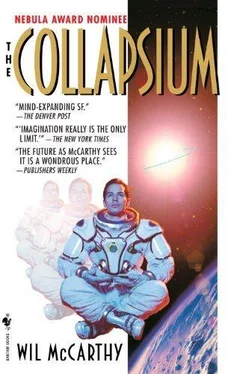The stranger wasn’t mocking him, but seemed actually to be sort of pitying or even pleading, like someone who’d stumbled on a suicide attempt in progress and had no idea what to say. But there was a kind of se//-mockery going on there, the voice reedy and whining, its tone deliberately obnoxious, as though its owner feared to speak with any decisive clarity or strength.
“What in the worlds has happened to you?” Bruno asked, and was relieved to hear more concern than disgust in his own voice. As the robots finished their work and danced away one by one, he stepped forward to offer the man a hand up. “Why have you come here?”
“What’s the date?” the stranger asked him in return. He declined the helping hand and stood up on his own, though he wobbled slightly. Were his knees weak? Injured, perhaps? As for dates, Bruno didn’t generally keep track of such things, but the house answered for him. “Sunday, February 28th, Year Ninety-Five of the Queendom.”
“Ah,” the stranger said, nodding. The look on his face was full of excitement, though of a stilted, unpleasant, untrustworthy variety. “Then I’ve been trapped in the grid for over two weeks, waiting for your port to open. I was afraid it mightn’t open—I know you too well!—but faxing to nowhere was much preferable to the alternative. And betrayer that I am, I did dare hope to reach you.”
Bruno’s frown deepened. “I don’t grasp your meaning, sir. Where have you come from?”
“From damnation itself!” the stranger said, cringing, and squeaked out a manic sound that was neither giggle nor sob.
“You think I’m jesting? Speaking in metaphors? He has a lot of anger toward you, and by extension toward myself, for having been you. Whips, chains, direct stimulation of the centers of’s-s-suffering? These are merely appetizers. The most disagreeable treatments you can possibly imagine are inadequate, mere infantile shadows of the truth, because you haven’t spent a lifetime reflecting on it, as He has.”
But Bruno was still shaking his head. “What do you mean, ‘having been me?’ Are you saying you’re Bruno de Towaji? A copy of myself?”
“Was,” the stranger spat. “Was. It’s a name I’ll sully no further. But yes; He pirates fax patterns out of the Iscog, and instantiates them in secret, in dungeons hidden away from civilized eyes and sensors. He’s particularly fond of your pattern—thereVe been dozens of us in His clutches at one time or another—but He keeps others as well: Rodenbecks, van Sketterings, Kroghs… He even kept a Tamra for a while, though it didn’t seem to please Him. He’s kept a few others on occasion. Not that they last long, of course, the way He uses them up, but they can always be freshly printed, the’s-s-same pain recipes tried over and over until they’re perfected. I represent an unbroken chain, decades long. In the midst of our sufferings we pass down the histories and lore, from one generation to the next. He encourages the practice, as it deepens our despair.”
Bruno could only stare. Was the stranger mad? Was he speaking from delusion, or some demented sense of jest? The two men stared at each other, the one unbelieving and the other unbelievable, for a long string of moments.
“May I sit?” the stranger finally asked, in the same whiny, ingratiating tones. He sounded tired, though. More than tired. Exhausted, in the literal sense: a container that had been squeezed of its contents. His knees quivered beneath his scrawny weight. He looked ready to faint. “I shudder to contaminate your furnishings, Bruno, or even your fine little floor, but my’s-s-strength is limited.”
“Are you really myself?” Bruno asked, horrified to his very core, unable to reconcile a single trait or feature of this exhausted container with his own self-image. But the question needed no answer—the house would have corrected the lie already, would never have admitted the stranger in the first place if he were, indeed, anything other than what he claimed. “My God, my God , yes, sit down over here! Lie back! House, bring us hot soup and blankets. Immediately!”
Steering the stranger—steering himself —toward the couch, he realized that it was warm enough in here, that there was no literal need for soup or blankets. But the house and the stranger seemed to understand; the gesture was symbolic. Robots brought woolen bedclothes, with which the stranger permitted Bruno to cover him, and a mug of steaming broth, from which he dutifully sipped.
“Ah,” the stranger sighed, “you’re too kind. Literally too kind, for I’ve betrayed your secrets and bartered off your dignity more thoroughly than you could ever know. He knows what moves you, what hurts you; He knows everything about you. He knows how you wipe your ass! I told Him all of this, over and over. I deserve none of your’s-s-sympathy. And yet here I am, seeking it. Further proof of my unworth!”
“No, no! My God, Bruno, who’s done this to you?”
The stranger sat up angrily. “Do not call me that! I am not a Bruno! Call me Shit, or Remnant, or Betrayer.”
Bruno, leaning forward against one arm of the couch, shook his head. “I’ll do no such thing.”
“Sir,” the stranger pleaded, “do not call me Bruno. Unless you seek to upset me, sir. I deserve that, but I don’t desire it.”
Hugo let out a sudden mewl. In a corner of the room, trapped between a table and the wall, it stood perplexed, contemplating its golden legs and the prison that held them, perhaps considering an act of self-mutilation—Hugo had removed a leg more than once, sometimes for less reason than this. Once it had even managed to remove both of its arms, and had stood over them forlornly for a solid day, ignored by the house software, until Bruno had finally taken pity, broken off his experiments, and taken a screwdriver to the poor thing.
But even Hugo possessed a measure of self-respect. Barely sentient, barely knowing it was alive at all, the “emancipated” robot nonetheless managed to find and fulfill the occasional desire. It managed to play a little, learn a little, live a little; this fact was clear in its bearing. The stranger, who had no such air about him, eyed the thing, suddenly, with an envy that looked like hunger.
“Come,” Bruno reassured, and wished there were someone else here to reassure him , or better yet that he’d wake up and find this whole incident to be a particularly loathsome dream, the result of a too-early bedtime after much too heavy and spicy a meal. “Come on, uh, friend. We’ll get you calmed down, and then the two of us can climb in the fax together and reconverge.”
Even as he said it, the idea struck him as a poor one.
The stranger’s reaction was violent. “Are you mad? Are you mad , Bruno? I am every imaginable poison and pathogen! Look at this wreck, this wreckage of yourself, and ask ‘tvhat these memories will do to that proud bearing of yours. I know your weaknesses, sir; I know them far better than you, and I say keep your distance. I am your worst imaginable betrayer, and even / recoil at the idea! I’ll never join with you. Never!”
Bruno pulled back a little, seeing the huddled figure in still another light: a man who had been himself, but was himself no longer. A man whose harrowing experiences set him apart, entitled him to a sense of identity quite distinct from Bruno’s own. Suddenly, he felt ashamed for having suggested otherwise.
“I will call you Brazowy,” he said gently. “Or perhaps Kafiese. Those are translations; they mean ‘brown’ or ‘brown haired,’ as Bruno does.”
“I know what they mean,” the stranger snapped. “But I warn you, sir: you overestimate the dignity I’m able to’s-s-sustain. Those names are fair and pretty; I couldn’t bear them. Call me Fuscus if you must.”
Читать дальше












